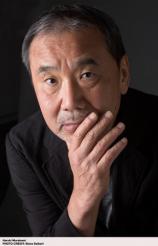Novelist as a Vocation
Review
Novelist as a Vocation
In the more than four decades since he published his first novel in Japan, Haruki Murakami’s books and stories have been translated into 50 languages, securing him a loyal worldwide readership. NOVELIST AS A VOCATION, originally published in Japan in 2015, collects 11 refreshingly candid essays on the writing craft and his successful, if idiosyncratic, literary career. Murakami has charted a singular path in the literary world, and while he cautions that aspiring writers won’t guarantee their success by following him, the book contains some valuable nuggets of advice and inspiration.
For someone who has produced an impressive body of work on a sustained basis, including popular and critically praised novels like THE WIND-UP BIRD CHRONICLE and 1Q84, Murakami’s literary origin story is decidedly unconventional. While attending an opening day baseball game in Japan in April 1978 and nearing his 30th birthday, he describes watching an American player connect for a double. “In that instant, and based on no grounds whatsoever, it suddenly struck me: I think I can write a novel.” Almost immediately thereafter, he set about doing just that.
"From an author who is frank about his dislike for personal appearances or promoting his work, NOVELIST AS A VOCATION will come as a welcome gift to Murakami’s many loyal readers, especially as they eagerly await the publication of his next work."
For roughly a decade preceding that epiphany, Murakami had been operating a jazz café in Tokyo. (Music is another passion and one that has heavily influenced his writing.) While still working full time at that endeavor, and heavily in debt, he diligently applied himself to the work of novel writing. He eventually produced HEAR THE WIND SING, the book that won him a prestigious Japanese prize for new writers and launched his career.
Since then, Murakami has produced a steady flow of novels, short stories (landing a contract with The New Yorker that has published nearly 30 of his stories to date), essays and translations that have kept him in the forefront of the literary world in his native country and abroad, where he has lived much of the time since the late 1980s.
Apart from Murakami’s reflections on his career, the craft essays in this collection are useful and consistently fun to read. “So What Should I Write About?” describes his highly personal system for collecting material. He has long been an omnivorous reader, a practice he says is essential for anyone who wants to write. But above all, he stresses the importance of constantly being observant, while being slow to make judgments about those observations. He rarely makes notes, confident that when it comes time to write, he can open what he calls his “expansive mental chest of drawers” to summon useful material.
“Making Time Your Ally: On Writing a Novel” offers a detailed description of Murakami’s working process, though he cautions that “anyone in their right mind would never undertake to write a novel in the first place.” He is strict about turning out 1,600 words (roughly 10 Japanese manuscript pages) each day. When he reaches his quota he stops, likening it to punching in and punching out on a time card. Once he has completed a first draft, he follows an equally rigorous process of rewriting before ever sharing his work with his editor.
In “What Kind of Characters Should I Include?” Murakami offers a useful discussion of his decision to shift from the first person voice of his early novels to third person. He admits that “in a certain sense, while the novelist is creating a novel, he is simultaneously being created by the novel as well.” But in “Who Do I Write For?” he makes it clear that, as much as he takes pleasure in the wide and highly engaged readership he has attracted, he has never departed from the idea that he is primarily writing to please himself.
In “A Completely Personal and Physical Occupation,” Murakami touches on some of the same ground he covered in his memoir, WHAT I TALK ABOUT WHEN I TALK ABOUT RUNNING. Since his early 30s, he has been an avid runner, competing in one marathon annually and several triathlons. He insists that sustained dedication to the act of writing (when he is immersed in writing a novel, he spends five or six hours each day at his desk) isn’t only an intellectual exercise, but one that “requires an extraordinary amount of physical strength.”
“Regarding Schools,” primarily an indictment of the Japanese educational (and to some extent social) system, one that Murakami says contributed little or nothing to the success of his literary career, is likely to be of less interest to Western readers. Similarly, “Going Abroad: A New Frontier,” the piece of memoir that concludes the collection and describes how his work traveled beyond Japan beginning in the late 1980s, mostly will appeal to literary insiders and those especially curious about the publishing business. One tidbit that should interest that audience is that he long shared an agent (Amanda Urban) and two editorial heavyweights (Sonny Mehta and Gary Fisketjon) with one of his idols, Raymond Carver, whose work he translated into Japanese.
From an author who is frank about his dislike for personal appearances or promoting his work, NOVELIST AS A VOCATION will come as a welcome gift to Murakami’s many loyal readers, especially as they eagerly await the publication of his next work.
Reviewed by Harvey Freedenberg on November 11, 2022
Novelist as a Vocation
- Publication Date: November 7, 2023
- Genres: Essays, Literary Criticism, Nonfiction
- Paperback: 224 pages
- Publisher: Vintage
- ISBN-10: 1101974532
- ISBN-13: 9781101974537




